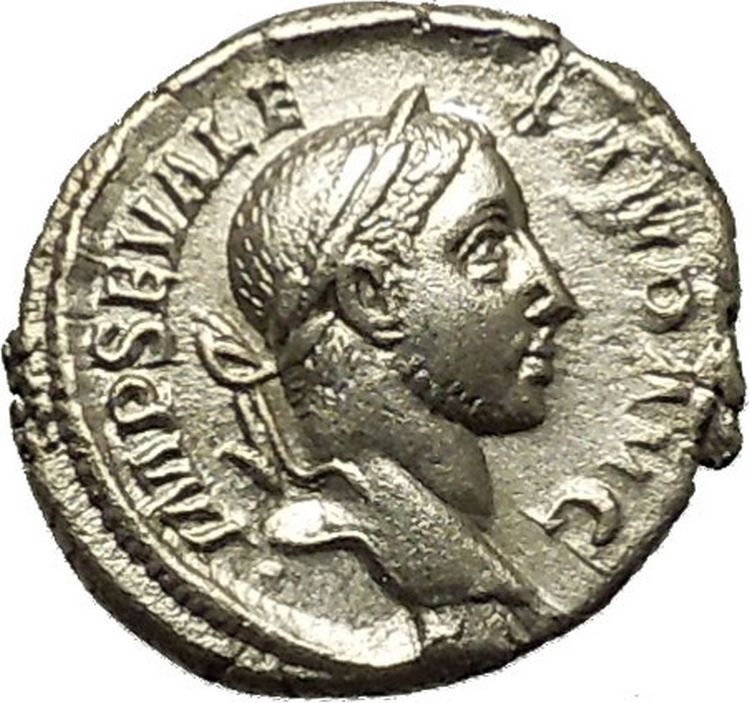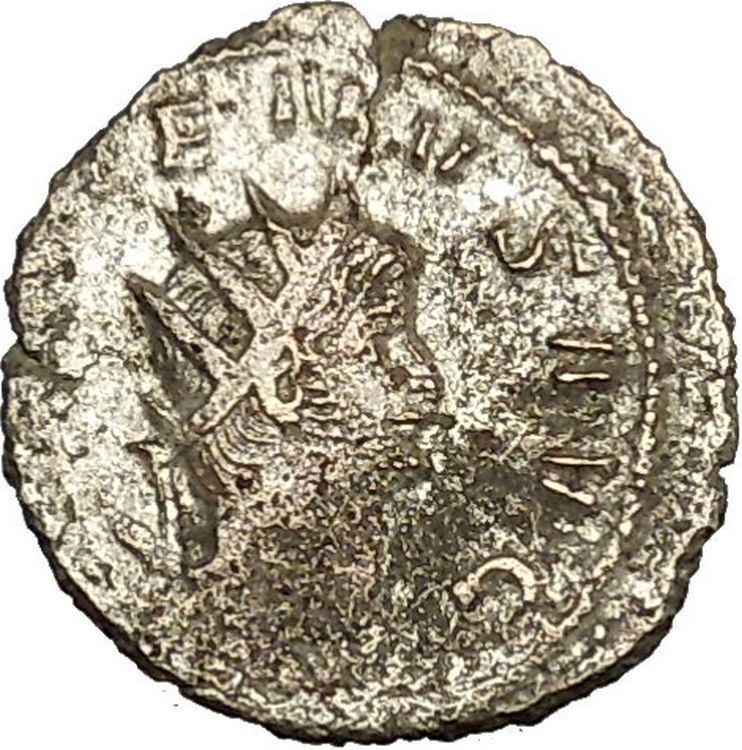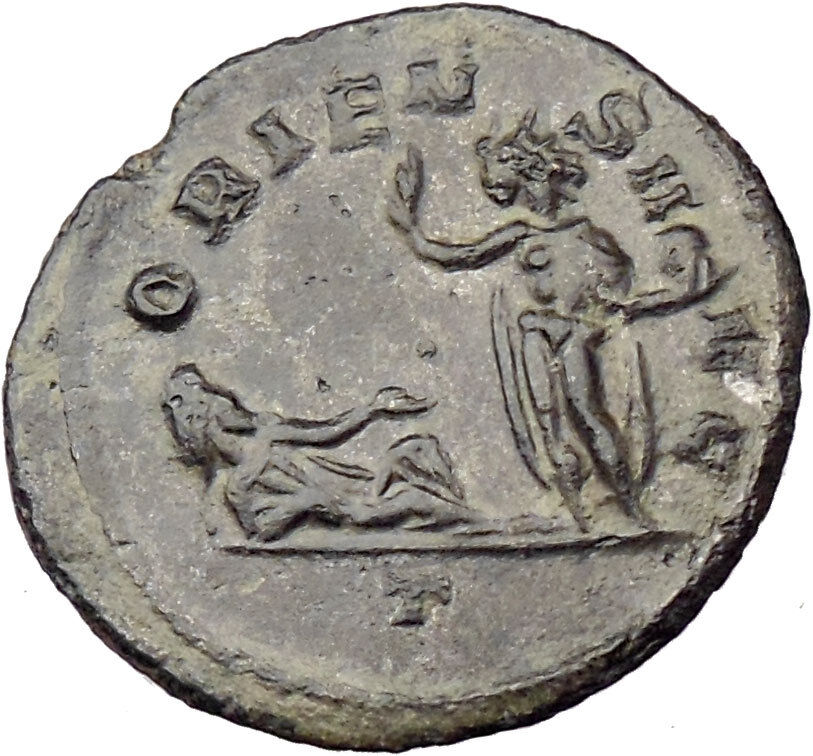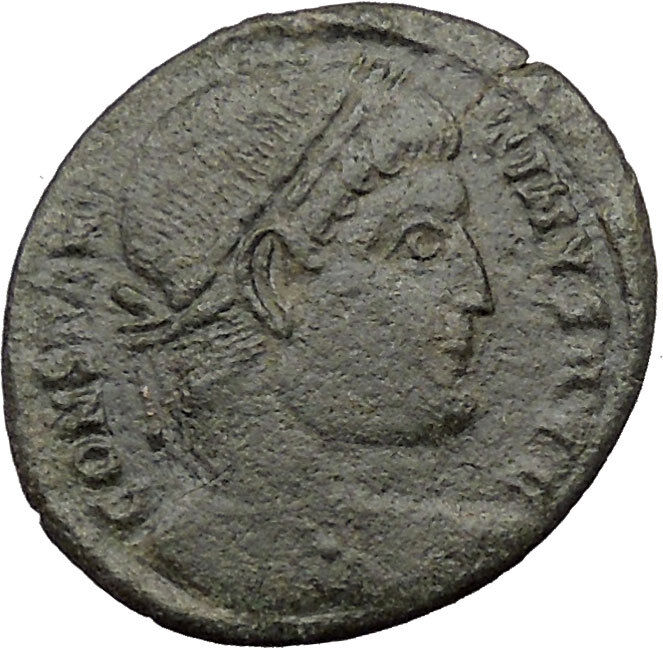|
Caracalla
–
Roman Emperor
: 198-217 A.D. –
Silver Denarius 20mm (3.56 grams) Struck circa 198-217 A.D.
Reference: RIC 25a; Sear’88 #1924; RSC 159.
IMP CAE M AVR ANT AVG P TR P, laureate, draped bust right
MINER VICTRIX, Minerva standing left beside trophy, holding Victory and spear.
You are bidding on the exact item pictured,
provided with a Certificate of Authenticity and Lifetime Guarantee of
Authenticity.
Minerva (Etruscan:
Menrfa, or Menrva) was the
Roman goddess
whom Hellenizing Romans from the
second century BC onwards equated with the Greek
goddess
Athena
. She was the virgin goddess of
poetry
,
medicine
,
wisdom
,
commerce
,
weaving
,
crafts
,
magic
, and the inventor of
music
. She is often depicted with an owl, her
sacred creature and is, through this connection, a symbol of wisdom.
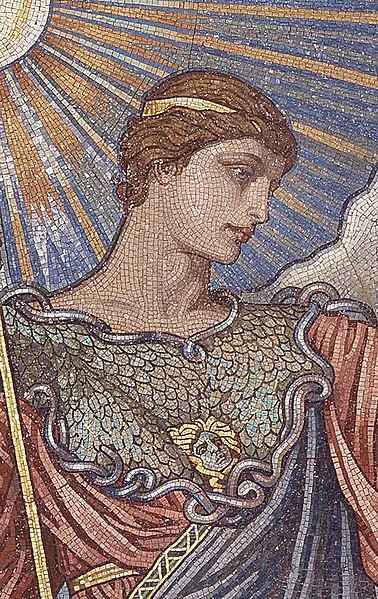
This article focuses on Minerva in ancient Rome and in
cultic practice
. For information on Latin
literary mythological accounts of Minerva, which were heavily influenced by
Greek mythology
, see
Pallas Athena
, where she is one of three virgin
goddesses along with
Artemis
and
Hestia
, known by the Romans as
Diana
and
Vesta
.
Etruscan
Menrva
The name “Minerva” is imported from the
Etruscans
who called her
Menrva
. Extrapolating from her Roman nature, it
is assumed that in
Etruscan mythology
, Minerva was the goddess of
wisdom, war, art, schools and commerce. She was the Etruscan counterpart to
Greek Athena
. Like Athena, Minerva was born from the
head of her father, Jupiter (Greek
Zeus).
By a process of
folk etymology
, the Romans could have confused
the phones
of her foreign name with those of the
root
men- in
Latin
words such as mens meaning “mind”, perhaps because one of her
aspects as goddess pertained to the intellectual. The word mens has the
Proto-Indo-European
mn- stem, linked
with memory as in Greek
Mnemosyne
(μνημοσύνη) and mnestis
(μνῆστις: memory, remembrance, recollection).
Worship
in Rome
Menrva was part of a holy
triad
with
Tinia
and
Uni
, equivalent to the Roman
Capitoline Triad
of Jupiter-Juno-Minerva.
Minerva was the daughter of Jupiter.
As Minerva Medica, she was the goddess of medicine and doctors. As
Minerva Achaea, she was worshipped at
Luceria
in
Apulia
where
votive gifts
and arms said to be those of
Diomedes
were preserved in her temple.
In Fasti
III,
Ovid called her the “goddess of a thousand works.” Minerva was
worshipped throughout Italy, though only in Rome did she take on the warlike
character shared by Athena. Her worship was also taken out to the empire — in
Britain, for example, she was conflated with the local wisdom goddess
Sulis
.
The Romans celebrated her festival from March 19 to March 23 during the day
which is called, in the neuter plural,
Quinquatria
, the fifth after the Ides of March,
the nineteenth, an
artisans
‘ holiday . A lesser version, the
Minusculae Quinquatria, was held on the Ides of June, June 13, by the
flute-players
, who were particularly useful to
religion. In 207 BC, a
guild
of poets and actors was formed to meet
and make
votive offerings
at the temple of Minerva on
the
Aventine
hill. Among others, its members
included
Livius Andronicus
. The Aventine sanctuary of
Minerva continued to be an important center of the arts for much of the middle
Roman Republic
.
Minerva was worshipped on the
Capitoline Hill
as one of the
Capitoline Triad
along with Jupiter and Juno,
at the
Temple of Minerva Medica
, and at the “Delubrum
Minervae” a temple founded around 50 BC by
Pompey
on the site now occupied by the church
of
Santa Maria sopra Minerva
Caracalla 198-217 A.D..
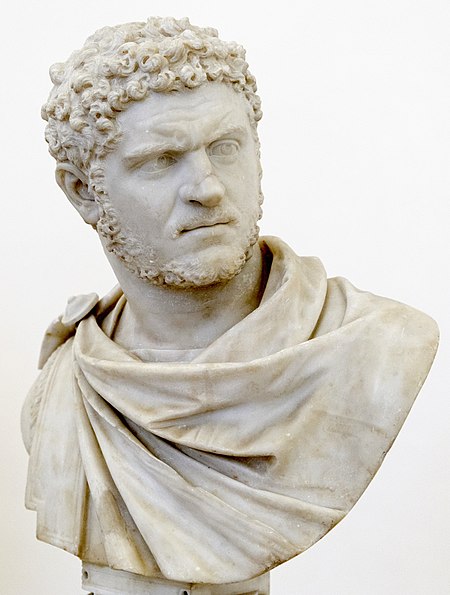
Caesar:
195-198 A.D. (under
Septimius Severus
)
Augustus: 198-217 A.D. (198-209 A.D. with
Septimius Severus
) (209-211 A.D. with
Septimius Severus
and
Geta
) (211 A.D. with
Geta
) (211-217 A.D. Sole Reign)
Son of
Septimius Severus
and
Julia Domna
| Brother of
Geta
| Husband of
Plautilla
| Nephew of
Julia Maesa
| Cousin of
Julia Soaemias
and
Julia Mamaea
|
Caracalla (Latin:
Marcus Aurelius Severus Antoninus Augustus;4
April 188 – 8 April 217) was
Roman emperor
from 198 to 217 The eldest son of
Septimius Severus
, for a short time he ruled
jointly with his younger brother
Geta
until he had him murdered in 211.
Caracalla is remembered as one of the most notorious and unpleasant of emperors
because of the massacres and persecutions he authorized and instigated
throughout the Empire.
Caracalla’s reign was also notable for the
Constitutio Antoniniana
(also called the
Edict of Caracalla), granting
Roman citizenship
to all freemen throughout the
Roman Empire
, which according to historian
Cassius Dio
, was done for the purposes of
raising tax revenue. He is also one of the emperors who commissioned a large
public bath-house (thermae)
in Rome. The remains of the
Baths of Caracalla
are still one of the major
tourist attractions of the Italian capital.
Early life
Caracalla, of mixed
Punic
–Roman
and Syrian
descent, was born Lucius Septimius
Bassianus in Lugdunum
,
Gaul (now Lyon
,
France
), the son of the later Emperor Septimius
Severus and
Julia Domna
. At the age of seven, his name was
changed to Marcus Aurelius Septimius Bassianus Antoninus to create a connection
to the family of the philosopher emperor
Marcus Aurelius
. He was later given the
Caracallanickname
,
which referred to the Gallic hooded tunic he habitually wore and which he made
fashionable.
Reign (211)
Murder of brother
(211)
His father died in 211 at
Eboracum
(now
York) while on campaign in northern Britain. Caracalla was present
and was then proclaimed emperor by the troops along with his brother
Publius Septimius Antoninus Geta
. Caracalla
suspended the
campaign in Caledonia
and soon ended all
military activity, as both brothers wanted to be sole ruler thus making
relations between them increasingly hostile. When they tried to rule the Empire
jointly they actually considered dividing it in halves, but were persuaded not
to do so by their mother.
Then in December 211 at a reconciliation meeting arranged by their mother
Julia, Caracalla had Geta assassinated by members of the Praetorian Guard loyal
to himself, Geta dying in his mother’s arms. Caracalla then persecuted and
executed most of Geta’s supporters and ordered a
damnatio memoriae
pronounced by the Senate
against his brother’s memory.
Geta’s image was simply removed from all coinage, paintings and statues,
leaving a blank space next to Caracalla’s. Among those executed were his former
cousin-wife
Fulvia Plautilla
, his unnamed daughter with
Plautilla along with her brother and other members of the family of his former
father-in-law
Gaius Fulvius Plautianus
. Plautianus had
already been executed for alleged treachery against emperor Severus in 205.
About the time of his accession he ordered the
Roman currency
devalued, the silver purity of
the denarius
was decreased from 56.5% to 51.5%, the
actual silver weight dropping from 1.81 grams to 1.66 grams – though the overall
weight slightly increased. In 215 he introduced the
antoninianus
, a “double denarius” weighing
5.1 grams and containing 2.6 grams of silver – a purity of 52%.
In the Roman provinces
In 213, Caracalla went north to the German frontier to deal with the
Alamanni
tribesmen who were raiding in the
Agri Decumates
. The Romans did defeat the
Alamanni in battle near the river
Main
, but failed to win a decisive victory over
them. After a peace agreement was brokered and a large bribe payment given to
the invaders, the Senate conferred upon him the empty title of Germanicus
Maximus. He also acquired the surname Alemannicus at this time. The
following year the tyrant traveled to the East, to Syria and Egypt never to
return to Rome.
Gibbon
in his work describes Caracalla as “the
common enemy of mankind”. He left the capital in 213, about a year after the
murder of Geta, and spent the rest of his reign in the provinces, particularly
those of the East. He kept the Senate and other wealthy families in check by
forcing them to construct, at their own expense, palaces, theaters, and places
of entertainment throughout the periphery. New and heavy taxes were levied
against the bulk of the population, with additional fees and confiscations
targeted at the wealthiest families.
When the inhabitants of
Alexandria
heard Caracalla’s claims that he had
killed Geta in self-defense, they produced a satire mocking this as well as
Caracalla’s other pretensions. In 215, Caracalla savagely responded to this
insult by slaughtering the deputation of leading citizens who had unsuspectingly
assembled before the city to greet his arrival, and then unleashed his troops
for several days of looting and plunder in Alexandria. According to historian
Cassius Dio, over 20,000 people were killed.[citation
needed]
Domestic Roman policy
Affiliation with
the army
During his reign as emperor, Caracalla raised the annual pay of an average
legionary to 675
denarii
and lavished many benefits on the
army which he both feared and admired, as instructed by his father Septimius
Severus who had told him on his deathbed to always mind the soldiers and ignore
everyone else. Caracalla did manage to win the trust of the military with
generous pay rises and popular gestures, like marching on foot among the
ordinary soldiers, eating the same food, and even grinding his own flour with
them.
With the soldiers, “He forgot even the proper dignity of his rank,
encouraging their insolent familiarity,” according to Gibbon. “The vigour of the
army, instead of being confirmed by the severe discipline of the camps, melted
away in the luxury of the cities.”
His official portraiture marks a break with the detached images of the
philosopher–emperors who preceded him: his close-cropped haircut is that of a
soldier, his pugnacious scowl a realistic and threatening presence. This rugged
soldier–emperor iconic archetype was adopted by most of the following emperors
who depended on the support of the troops to rule, like his eventual successor
Maximinus Thrax
.
Seeking to secure his own legacy, Caracalla also commissioned one of Rome’s
last major architectural achievements, the
Baths of Caracalla
, the 2nd largest public
baths ever built in ancient Rome. The main room of the baths was larger than
St. Peter’s Basilica
, and could easily
accommodate over 2,000 Roman citizens at one time. The bath house opened in 216,
complete with libraries, private rooms and outdoor tracks. Internally it was
lavishly decorated with gold-trimmed marble floors, columns, mosaics and
colossal statuary.
Edict of
Caracalla (212)
The
Constitutio Antoniniana
(Latin: “Constitution
[or Edict] of Antoninus”) (also called Edict of Caracalla) was an edict
issued in 212 by Caracalla which declared that all free men in the Roman Empire
were to be given full Roman citizenship and all free women in the Empire were
given the same rights as Roman women.
Before 212, for the most part only inhabitants of Italia held full Roman
citizenship. Colonies of Romans established in other provinces, Romans (or their
descendants) living in provinces, the inhabitants of various cities throughout
the Empire, and small numbers of local nobles (such as kings of client
countries) held full citizenship also. Provincials, on the other hand, were
usually non-citizens, although many held the
Latin Right
.
The Roman Historian
Cassius Dio
contended that the sole motivation
for the edict was a desire to increase state revenue.At the time aliens did not
have to pay most taxes that were required of citizens, so although nominally
Caracalla was elevating their legal status, he was more importantly expanding
the Roman tax base. The effect of this was to remove the distinction that
citizenship had held since the foundation of Rome and as such the act had a
profound effect upon the fabric of Roman society.
War with Parthia
According to the historian Herodian, in 216, Caracalla tricked the Parthians
into believing that he accepted a marriage and peace proposal, but then had the
bride and guests slaughtered after the wedding celebrations. The thereafter
ongoing conflict and skirmishes became known as the
Parthian war of Caracalla
.
Assassination (217)
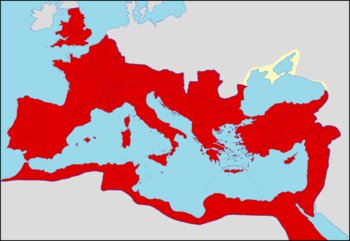
The Roman Empire during the reign of Caracalla.
While travelling from
Edessa
to continue the war with
Parthia
, he was assassinated while urinating at
a roadside near
Carrhae
on 8 April 217 (4 days after his 29th
birthday), by Julius Martialis, an officer of his personal bodyguard.
Herodian
says that Martialis’ brother had been
executed a few days earlier by Caracalla on an unproven charge; Cassius Dio, on
the other hand, says that Martialis was resentful at not being promoted to the
rank of centurion. The escort of the emperor gave him privacy to relieve
himself, and Martialis then ran forward and killed Caracalla with a single sword
stroke. While attempting to flee, the bold assassin was then quickly dispatched
by a Scythian archer of the Imperial Guard.
Caracalla was succeeded by his
Praetorian Guard Prefect
,
Macrinus
, who (according to Herodian) was most
probably responsible for having the emperor assassinated.
His nickname
According to
Aurelius Victor
in his Epitome de Caesaribus,
the agnomen
“Caracalla” refers to a Gallic
cloak
that Caracalla adopted as a personal
fashion, which spread to his army and his court. Cassius Dio and the
Historia Augusta
agree that his nickname
was derived from his cloak, but do not mention its country of origin.
Legendary king of
Britain
Geoffrey of Monmouth
‘s legendary
History of the Kings of Britain
makes
Caracalla a king of Britain, referring to him by his actual name “Bassianus”,
rather than the nickname Caracalla. In the story, after Severus’s death the
Romans wanted to make Geta king of Britain, but the Britons preferred Bassianus
because he had a British mother. The two brothers fought a battle in which Geta
was killed and Bassianus succeeded to the throne. He ruled until he was betrayed
by his Pictish
allies and overthrown by
Carausius
, who, according to Geoffrey, was a
Briton, rather than the historically much later
Menapian
Gaul that he actually was.
|








